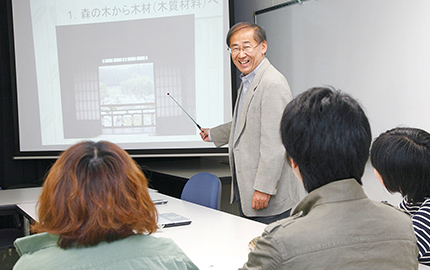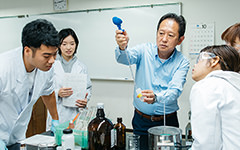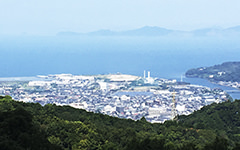Overview

The Graduate School of Environmental & Symbiotic Sciences offers both a master’s degree program and a doctoral degree program. The master’s degree program branches into two areas and six fields, which provides students opportunities to deeply research environmental and symbiotic sciences while keeping the interrelationships among these six research fields in perspective. The doctoral degree program reorganizes its focus in education so that the six fields coalesce into one; this consolidation allows doctoral students to conduct deep research from six perspectives in order to demonstrate mastery of environmental and symbiotic sciences.
Admission Policy
1. Goals for personal development
(1) Master’s course
1. The training of professionals with advanced skills
Since there is an extremely large social demand for human resources who have detailed knowledge of environmental issues, the Master’s course aims to train highly skilled professionals with professional and academic knowledge of environmental and symbiotic sciences.
2. The training of researchers
We train students who will be able to enter the doctoral course, and also who play important roles in research and development departments at public research institutions or private companies.
3. The training of advanced educators
The course aims to educate students who have advanced professional knowledge, and to participate actively in the educational field.
4. Re-Education for members of society
Since we open our programs widely to members of society, we provide people with a chance to re-educate themselves in their professional field again with a viewpoint of the environment. This course provides them with an opportunity to study their disciplines by themselves. This course trains personnel with professional knowledge of environmental and symbiotic sciences.
(2) Doctoral course
1. The training of personnel with advanced skills
Since there is an extremely large social demand for personnel who have detailed knowledge of environment issues, the Doctoral course aims to develop professionals with advanced skills who should be leaders in the near future and who possess professional and academic knowledge of environmental and symbiotic sciences.
2. The training of researchers
We train students who will become human resources in the field within universities or other institutions regarding the environment, or who play an active role and use their skills as leaders in research and development departments at public institutions or private companies.
3. Advanced education for members of society in their major field
Since we open our program widely to members of society, we provide people with a chance to re-educate themselves in their professional field from a viewpoint of the environment as leaders. This course trains personnel with widespread professional knowledge of environmental and symbiotic sciences.
4. The training of personnel from foreign countries
We accept students and members of society with a Master’s degree (or same level of ability) from foreign countries, and we train leading personnel who have basic philosophy of environmental and symbiotic sciences, professional knowledge, and sophisticated technology.
2. Requirements for human resources
(1) Master’s course
Based on a philosophy of the Graduate School of Environmental & Symbiotic Sciences, we ask you to achieve basic academic ability during undergraduate work, and have good presentation skills and linguistic ability. We look for students who are recognized as having high research motivation or are members of society who have much experience in a related field of research.
(2) Doctoral course
Based on the philosophy of the Graduate School of Environmental & Symbiotic Sciences, we ask you to achieve basic academic ability, as well as acquire appropriate presentation skills and linguistic ability throughout the Master’s program. We look for students who are recognized as having high research motivation or are members of society who have much experience in a job of developing research in a related professional field.
3. The method of selecting new students
We select new students using the total score of interviews and screening documents of the research plan, the result of examinations (English, Specialized subject).
Special Admission Quota for International Postgraduate Scholarship for Research on Mercury
Application Guide for Admission (PhD Program Fall Enrollment)(PDF)
Configuration of the Graduate School
Admission Capacity for the Division of Environmental & Symbiotic Sciences
- Master’s Degree Program: 20
- Doctoral Degree Program: 3







